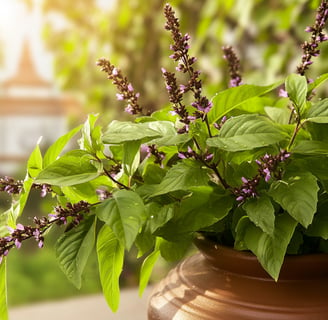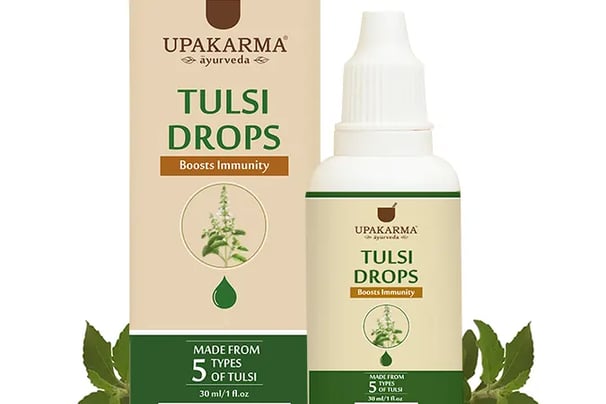Tulsi: The Sacred Herb
IMMUNITY SUPPORTANTI OXIDANTBLOOD SUGAR MANAGEMENT


Tulsi, also known as Holy Basil (Ocimum sanctum), is revered in Ayurveda as the "Queen of Herbs" for its remarkable healing properties. Native to the Indian subcontinent, Tulsi has been an integral part of Indian households for thousands of years, not only for its spiritual significance but also for its diverse medicinal benefits. This blog delves into the origins, key properties, historical use, and modern applications of Tulsi in promoting health and wellness.
Where is Tulsi Grown?
Tulsi is predominantly cultivated in India, particularly in regions with tropical and subtropical climates. It also grows in other parts of Southeast Asia and is increasingly cultivated worldwide due to its rising popularity in herbal medicine.
The Tulsi plant is a hardy, aromatic shrub that thrives in well-drained soil and ample sunlight. It grows up to 60 centimeters tall and is distinguished by its green or purple leaves, small purple or white flowers, and a strong, pleasant aroma.
Key Properties and Constituents of Tulsi
Tulsi owes its medicinal value to a rich blend of bioactive compounds, including:
Eugenol
A powerful antioxidant and anti-inflammatory compound that protects cells from oxidative stress and reduces inflammation.
Ursolic Acid and Oleanolic Acid
These compounds exhibit anti-cancer, anti-inflammatory, and antimicrobial properties.
Rosmarinic Acid
Known for its antioxidant, anti-inflammatory, and neuroprotective effects.
Flavonoids
Tulsi contains flavonoids such as orientin and vicenin, which provide antioxidant protection and support immune health.
Essential Oils
Including camphor, eugenol, and cineole, which have antimicrobial, anti-inflammatory, and stress-relieving properties.
Historical Use of Tulsi
Tulsi has a rich history in Ayurveda, where it is classified as a Rasayana (rejuvenator) and an adaptogen that helps the body cope with stress and maintain balance.
In ancient texts such as the Charaka Samhita and Sushruta Samhita, Tulsi is described as a remedy for:
Respiratory disorders such as asthma, bronchitis, and colds.
Digestive issues, including indigestion and bloating.
Stress, anxiety, and mental clarity.
Skin diseases and wound healing.
Fever and infections.
Tulsi is also considered sacred in Hindu culture, often planted in courtyards and worshipped for its spiritual significance and protective energy.
Tulsi in the Modern Age
With the growing interest in natural remedies, Tulsi has become a popular herb in modern wellness routines. Scientific studies have validated many of its traditional uses, making it a versatile and essential herb for contemporary health care.
Stress Reduction and Adaptogenic Properties
Tulsi helps reduce stress by regulating cortisol levels and enhancing the body's ability to cope with physical, mental, and emotional stress. A 2014 study in the Journal of Ayurveda and Integrative Medicine demonstrated that Tulsi supplementation significantly reduced stress and improved mood in participants.
Immune Support and Antimicrobial Activity
Tulsi boosts immune function by enhancing the production of immune cells such as T-cells and natural killer cells. Its antimicrobial properties help combat bacterial, viral, and fungal infections, making it an effective natural remedy for colds, flu, and other infections.
Respiratory Health
Tulsi is widely used to treat respiratory conditions due to its anti-inflammatory, antimicrobial, and expectorant properties. It helps relieve symptoms of asthma, bronchitis, sinusitis, and colds by reducing inflammation in the airways and clearing mucus.
Antioxidant and Anti-inflammatory Effects
Tulsi's high antioxidant content protects cells from oxidative damage, reducing the risk of chronic diseases such as cardiovascular disease, diabetes, and cancer. Its anti-inflammatory effects help alleviate conditions like arthritis and inflammatory bowel disease.
Cognitive Function and Mental Clarity
Tulsi supports brain health by reducing oxidative stress and inflammation in the brain. Studies have shown that Tulsi improves memory, focus, and cognitive function, making it beneficial for students, professionals, and older adults.
Metabolic Health and Blood Sugar Regulation
Tulsi helps regulate blood sugar levels by improving insulin sensitivity and reducing blood glucose levels. A 2012 study in the Journal of Medicinal Food found that Tulsi supplementation significantly reduced fasting blood sugar and HbA1c levels in patients with type 2 diabetes.
Skin and Hair Health
Tulsi's antimicrobial and anti-inflammatory properties make it effective in treating acne, eczema, and other skin conditions. It also promotes healthy hair by reducing dandruff and strengthening hair follicles.
How to Use Tulsi
Tulsi is available in various forms, including:
Fresh or dried leaves: Used in teas, infusions, and culinary dishes.
Powder: Can be mixed with water, smoothies, or honey.
Capsules/Tablets: Convenient for precise dosages.
Essential oil: Used in aromatherapy, massage, and topical applications.
The recommended dosage typically ranges from 300 to 600 mg per day, but it is advisable to consult a healthcare provider before starting supplementation.
Conclusion
Tulsi, with its rich history, potent bioactive compounds, and scientifically proven benefits, continues to be a cornerstone of holistic health and wellness. As a natural adaptogen, it offers a comprehensive solution to modern-day challenges such as stress, infections, respiratory issues, and metabolic disorders. Incorporating Tulsi into your daily routine can unlock numerous health benefits, making it a timeless remedy for both ancient and contemporary wellness needs.


iyurvedik elements
Longevity Ayurveda. Live Your Best Life
Connect
info@iyurvedik.com
© 2025. All rights reserved.
Disclaimer: If you have an acute or chronic disease, please seek medical attention from a qualified doctor. Although the Ayurvedic principles and practices presented here are beneficial in most cases, they should not be used as a means of clinical diagnosis or treating pathological conditions. Ayurvedic lifestyle is an excellent adjunct to all forms of medical care, but it is not a substitute for professional care from a physician.
